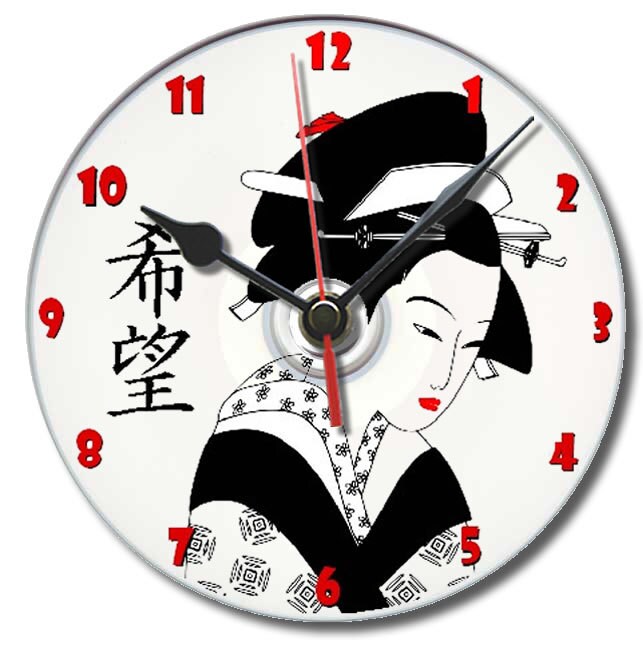Everything and everyone in Japan seems to be almost always on time. Trains and buses come and go on time. People arrive on time whether it's a business meeting or social call. Offices open and banks close on time. Everything is a clockwork.
 |
| photo credit: http://www.etsy.com/listing/110834872/geisha-girl-japanese-design-oriental-cd |
For the past months, here are some interesting things I have learned about Japanese punctuality.
1. To be on time means to be present 5-10 minutes earlier.
This is the first thing I have learned when I arrived in Japan. You can't simply be virtually on time. You have to be at your workplace 5 to 10 minutes BEFORE the time. A Japanese friend told me that maybe Japanese are like this so the actual work, meeting or whatever can start on time. I'm not sure if her explanation has basis or just an opinion but I think there's some truth to what she said. Personally, I feel more psychologically ready to work or to have a meeting when I am already in the place a few minutes before the actual time. These few minutes seem to give me some breathing and warming up time.
2. Unless it's a life and death situation, there is no excuse for tardiness.
Traffic is not an excuse for being late. Household chores and other tasks are also unacceptable. Only severe conditions in winter is valid for being late. Whatever the excuse is, if you're late-you're late. One of my superiors explained that this is how with Japanese because they think that things happen everyday. It's up to the person how he will cope up with it- including how he'll arrive at work on time.
3. Be sincerely sorry.
So when you're late, just say sorry. No need to make excuses or even explain lengthily. Your boss or people affected with your tardiness do not need to understand you. They do not need to know the ins and outs of your tardiness. You just have to hope that they'll sincerely forgive you.
4. You can't get away with habitual tardiness.
In the Philippines, employees who are chronically tardy can get warnings, written reprimands and suspension.
Unless you're really a bad employee, your superiors can overlook your habitual tardiness. In Japan, to be habitually tardy means to be untrustworthy and irresponsible. Therefore, if you're habitually late don't expect to keep your job. This is what exactly happened to a girl in my company. She's late almost two times a week, always says sorry with the principal always telling her it was okay. Then after two months, she was fired.
5. Be on time even in social gatherings such as house warming parties, social visits, etc.
In some countries, being on time can mean differently when applied in social gatherings such as house parties. In Japan, punctuality is still observed even in house parties and invitational social visits. It is a sign of rudeness when you turn in late as a guest. As one of the mys students said, being late for a social event means you did not give due importance to the person who invited you. Being late is treated as a personal matter.
Universally, people may agree that punctuality is important but a lot of countries still struggle with it. Here in Japan, you don't only agree that it is important. You have to show how important it is so you can also be treated with importance.
